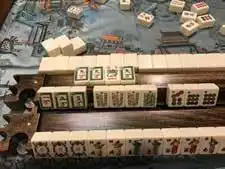
3 minute read
Mah Jongg is Flourishing in USC
The tile-based game Mah Jongg has been popular in Asia for hundreds of years, where it is ingrained in culture and tradition. It also is a game that has significant meaning to Upper St. Clair resident Sarah Beitler.
Sarah learned how to play Mah Jongg as a teenager from her maternal grandmother. She has fond memories of playing at her grandmother’s table, hearing the clicking of the tiles and her grandmother’s thick New York accent calling out “north” or “flower” or “One bam.” When her grandmother passed away in 2015, Sarah inherited a few of her grandmother’s Mah Jongg sets. She took them back to her home in Upper St. Clair and decided to honor her grandmother’s memory by teaching her friends how to play. They quickly caught on, and interest in Sarah teaching Mah Jongg to others began to grow.
Mah Jongg uses tiles rather than cards for a rummy-like strategy game. Through a process of picking up and discarding tiles, players try to create specific 14-tile combinations that will allow them to call out “Mah Jongg!,” thereby winning the round. The original game was developed in China during the Qing Dynasty (1644–1912) and has spread throughout the world since the early 20 th century. In the 1920s, the game of Mah Jongg was brought to the U.S. by an American businessman, Joseph Babcock. He created a variation of the Chinese game to appeal to the American public. It became a hit, and since then the game has continued to grow and evolve. In 1937, a number of Mah Jongg enthusiasts met in New York City to standardize the game so that all Mah Jongg players would play with the same hands and rules. It was at this meeting that the National Mah Jongg League (www.nationalmahjonggleague.org) was founded. Each April, the League produces a new tri-fold card of winning tile sequences. With a new set of possible winning hands released annually, the variety keeps players on their toes and engaged year after year. Sarah currently plays with a few different local groups and has started teaching the game at the Community & Recreation Center at Boyce Mayview Park (C&RC), the Fox Chapel Adult Education Center, and in private homes (for groups of four or more). Sarah also runs a Pittsburgh-area Mah Jongg tournament every October called “Mahj For Sight,” which benefits sight-related charities, including the Blind and Vision Rehabilitation Services of Pittsburgh, Western Pennsylvania School for Blind Children, and the Delta Gamma Foundation.
Sarah thinks everyone should learn to play Mah Jongg, as learning this type of game can be beneficial to one’s health. A recent research study conducted by the Wisconsin Alzheimers Institute and Harvard University shows that, along with a healthy lifestyle, activating brain waves by playing games reduces the risk of dementia. Routine social and intellectual stimulation offered by mentally challenging games, including Mah Jongg, bridge, and dominoes, sharpen mental acuity and boost the immune system.
Mah Jongg also gives players a reason to stay socially engaged and meet other likeminded people. For Sarah, it initially allowed her an opportunity to meet in the evenings with other moms of young children. Over the click of the tiles, they could compare notes on their kids or share a laugh about motherhood. Fellow player and USC resident Micki Tacki agrees. “As a stay-at-home mom, I appreciate the problem solving strategies of Mah Jongg that have nothing to do with managing schedules or who likes what brand of mac and cheese,” she said. Heather Irwin, also from USC, adds, “It’s nice to have some adult time away from our young children. Now, my ten-year-old son is learning to play!” For a retired adult, Mah Jongg can provide a social outlet and a fun reason to get together to share life’s milestones along with its more mundane moments. USC resident Kelly Schwimmer remembers her own mother playing. “Nothing like the clacking of tiles through the generations,” she said.
Regardless of age or stage in life, Mah Jongg provides players a way to come together, share the love of the game, make new friends, and appreciate the happenings in each others’ lives. It is a great brain exercise because it requires some skill, but it’s also a lot of fun and a great way to meet new friends.

Sarah Beitler (standing) leads a game of Mah Jongg with Upper St. Clair friends, including, left to right, Sian Howell, Heather Irwin, Laura Muhl, and Kelly Schwimer.
Photo Credit: Thomas Irwin, Heather's 10 year old Son

An ornate Mah Jongg Set.

Kelly Schwimer, sporting her MAHJDA license plate.



